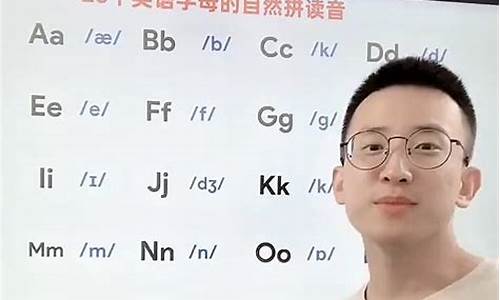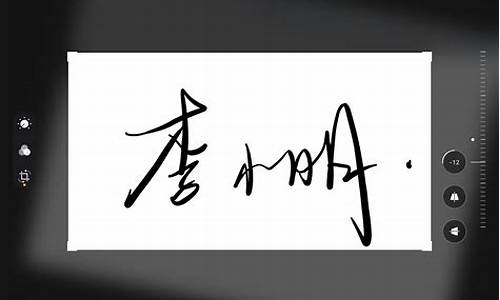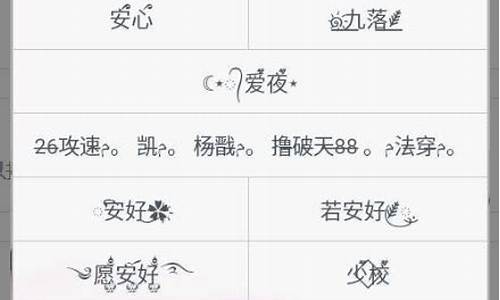您现在的位置是: 首页 > 文案大全 文案大全
句子的英语怎么读aloud_句子的英语怎么读 单词怎么写
tamoadmin 2024-09-07 人已围观
简介1.翻译英语词组2.how you learn English与how do you learn English区别3.请问:你今天读英语了吗?这个句子用英语怎样翻译?4.用英语翻译下列句子:1我们大家都认为他是诚实的。2他们把小偷释放了。3我要你把真相告诉我。4每天早晨...5.高中英语阅读D篇翻译,只翻译红色句子6.谁能总结一下初中英语短语,例如to do sth,doing sth.之类的
1.翻译英语词组
2.how you learn English与how do you learn English区别
3.请问:你今天读英语了吗?这个句子用英语怎样翻译?
4.用英语翻译下列句子:1我们大家都认为他是诚实的。2他们把小偷释放了。3我要你把真相告诉我。4每天早晨...
5.高中英语阅读D篇翻译,只翻译红色句子
6.谁能总结一下初中英语短语,例如to do sth,doing sth.之类的

1.aloud adv.出声地(使别人能听得到)
Reading aloud is a good way in leaning English.
朗读是学英语的一个好方法。
▲loud adj. 大声的,声音洪亮的,loud—louder—loudest
He talked in a loud voice so that everyone could hear him.
他说话声音很大以便于每个人都能听得到他。
▲adv. loud—louder—loudest
Don’t talk so loud.The kids are reading.
说话小声些,孩子们正在看书。
(Speak)louder,please!
请再说高一些!
▲loudly adv吵吵闹闹地,噪声地
I heard someone knocked loudly at the door.
我听到有人在使劲敲门。
They are talking loudly in the next room.
他们在隔壁说话声很大。
2.voice n.噪音,鸟鸣声
She has a sweet voice.
她声音很甜美。
She raised her voice so that she could be heard.
她提高了嗓音队便于别人能听清楚。
He lost his voice./He had no voice because of the cough.
因为咳嗽,他失声了。
▲noise n噪音,吵闹
Don’t make so much noise.
别弄出那么大的噪音。
I heard a strange noise outside.
我听到外边奇怪的声音。
▲sound n.(自然界中的)声音,响声
Sound trels slower than light.
声音的传播比光慢。
3.memory n.(计算机的)储存器
A lot of information is stored in the memory.
计算机的储存器能储存很多信息。
▲n.记忆力
He has a poor memory after the car accident.
后他的记忆力很差了。
▲n. 回忆,怀念
I he a pleasant memory of my childhood.
我对童年有美好的回忆。
▲memorize/memorise vt. 记住,背过
He can memorize new words very quickly.
他能很快记住很多单词。
4. frustrate vt.使失望,使沮丧
The serious illness frustrated his dream for college.
他上大学的梦想遭受挫折。
▲frustrating adj. 令人失望的
What he said is frustrating.
他所说的话很令人失望。
She finds it frustrating to watch English movies.
她觉得看英语**很令人失望(因为看不懂)。
▲frustrated adj. 失望的,沮丧的
He was frustrated when he failed again in the test.
当他再次考试没及格后,他很失望。
5.add vt. 增加,加
She tasted the soup and added more salt.
她尝了尝汤,又加了些盐。
▲add to 增添
His coming added to our trouble.
他的到来给我们添了很多麻烦。
▲add up to 总计达……,加起来……
The number of the students in our class adds up to 55.
我们班上学生的数目加起来是55人。
▲vt. 补充说,又说
He said goodbye to us and added that he would visit us again.
他和我们说了再见,又说他会再来看我们的。
6. excite vt.使兴奋
The news that our team had won excited everybody.
我们队赢了的消息令所有的人很激动。
▲exciting adj.令人兴奋的
The game is exciting.
那场足球赛很令人激动。
▲excited adv. 兴奋的,激动的
We were very excited at the news.
当听到那个消息,我们很激动。
7.speak(speak—spoke—spoken)说(语言),讲话
Can you speak French?
你会说法语吗?
Do you know who will speak at the meeting?
你知道谁要在会上发言?
▲talk to/with sb 与某人谈话,talk about/of sth/sb谈论某人或某事
He was talking to/with his friend whom I called him.
当我给他打电话时,他正在和他的朋友谈话。
What are you talking about?
你们在说什么?
▲say 说(后接说的内容)
What did he say at the meeting?
他在会上说了什么?
She said she would be back the next week.
她说下周回来。
▲tell 告诉
tell sb sth 告诉某人某事(接双宾语)
Who told you the news?
是谁告诉你的那个消息?
▲讲,说
tell stories讲故事,tell a lie撒谎,tell the truth说实话
Grandma used to tell stories to me when 1 was young.
我小的时候,奶奶经常给我讲故事。
Don’t believe him! He is telling a tie.
别信他!他在撒谎。
To tell you the truth,I don’t quite agree with you.
老实说,我不太同意你的意见。
8.complete vt.使完全,使完整,(圆满完成)
She’s trying to complete collection of the CDs.
他试图收齐那套CD。
▲adj. 巧完整的,完全的
Can you make complete sentences?
你会造完整的句子吗?
He is a complete stranger to me.
他对我来说完全是陌生的。
9.secret n.秘密
It’s a secret between you and me,so don’t tell it to others.
那时我们之间的秘密,所以不要告诉别人。
▲adj. 秘密的
Let’s keep it secret from others.
咱们不让别人知道此事。
Let the cat out of the bag.= Let out the secret.
泄露秘密。
10.impress vt.使感动,给……深刻印象
What he did impressed everybody present.
他的事迹给在场的人留下了深刻的印象。
The beautiful sights of the country impressed all of us.
那个国家的美景打动了我们所有的人。 、、
▲impressed adj. (被)感动的
We were impressed by what he did.
我们被他的话所感动。
11. native n. 当地人,本国人
When we were on vacation in Brazil,we lived like the natives.
我们在巴西度时,就像当地人那样生活。
The kangaroo is a native of Australia.
袋鼠是产于澳洲的动物。
▲native speaker 生来就说某种语言的人
He speaks English so well that we all think he is a native speaker·
他的英语说得太好了,我们都认为他是个本地人。
▲native language 母语
Marx was born in Germany,and German was his native language.’
马克思出生在德国,法语是他的母语。
Important phrases(重点词组)
人民教育出版社教学分社
1.1isten to cassettes 听磁带
2.first of all 首先
3.work/study with a group 和小组一起学习
4.watch English language TV 看英语电视
5.spoken English 英语口语
6.writing practice 写作训练
7.join an English club 加入英语俱乐部
8.1ater on 以后;随后
9.look up words(in a dictionary) 查同典
10.native speakers 生来就说某种语言的人
11.not at aIl 根本不;一点也不
12.end up 结束
13. ask the teacher for help 求助于老师
14.make up 组成;编造
15.enjoy doing sth 喜欢做某事
16.take notes 做笔记
17.make mistakes 犯错误
1 8.make flashcards 制作认读卡片
19.read aloud 朗读
20. he trouble (in) doing sth 做某事有困难
Important sentences(重点句子)
人民教育出版社教学分社
1. How do you study for a test?
你怎样准备考试?
▲study for a test prepare for a test 准备考试
— What were you doing when I called last night?
一I was studying for the math test.
一 昨天晚上我打电话时你在干什么?
一 我在准备数学测验。
2. I study for an English test by listening to cassettes.
我听录音准备英语测验。
▲by 靠,用(方法,手段等),后接动名词(doing…)
He makes a living by repairing bikes.
他靠修车为生。
▲listen vi.后加to再接名词。
My sister was listening to music when I got home.
当我到家时,姐姐正在听音乐。
Listen! Someone is knocking at the door.
听!有人在敲门。
3.He studies by asking the teacher for help.
他靠求助于老师来学习。
▲ask sb for help求助于某人
—You can ask me for help if you he trouble.
—Thank you.1 will.
— 如果你有麻烦,你可以求助于我。
一 谢谢。我会的。
4.Do you ever practice conversations with friends?
你曾经和朋友练习过会话吗?
▲ever adv. 用于疑问句和否定旬中,“曾经”
Do you ever worry that you’11 fail a test?
你担心考试会不及格吗?
▲practice vt.(Am.E) = practice (Br.E) 练习
▲在美国英语中practice既可作名词又作动词;但在英国英语中practice为名词;practise为动词。
5. What about listening to cassettes?
听录音怎么样?
▲what about + n./pron/doing? =how about + n/pron/doing。例如:
What/How about going to the movies tonight?
今晚去看**怎么样?
6. What about reading aloud to practice pronunciation?
靠朗读来练习发音怎么样?
read aloud 朗读
Reading aloud is very helpful in leaning English.
朗读在学英语中很有帮助。
7.I’ve learned a lot that way. 我那样学到了很多。
▲a lot 代表一个不可数名词。例如:
Though he is young,he knows a lot.
他虽然很小,但他知道很多。
▲that way相当于一个副词,way用于which,this,that之后,构成短语,“那样”。如:
Don’t talk to your parents that way.
别那样和父母说话。
8.It improves my speaking skills.
它能提高我的口语技巧。
▲Improve vt. 改进,改善,提高
His work is improving slowly.
他的工作在慢慢改进。
Her pronunciation has greatly improved.
他的发音大大提高了。
▲speaking skill 口语技巧 listening skill 听力技巧
writing skill 写作技巧 reading skill 阅读技巧
9. It’s too hard to understand to voices.
听懂不同的声音很困难。
▲too + adj./adv. + to do “太……而不能……”。又如:
He is too young to go to school.
他太小,不能上学。
She runs too slow to catch up with me.
她跑得太慢追不上我。
10.This week we asked students at New Star High School about the
best ways to learn more English.本周我们问新星中学学生关于多学点英语的最好方法。
▲ask sb about sth 询问某人关于……的情况
Ask her about the pen that you lost.She may he found it.
问问她你丢的钢笔,也许她捡到了。
▲the best ways to do sth = the best ways of doing sth 做……的好办法
Who can tell me the best way of memorizing/to memorize new words?
谁能告诉我记单词的最好办法是什么?
11. She said that memorizing the words of pop songs also helped a little.
她说记流行歌曲的歌词也有点帮助。
▲that引导的是宾语从句,在宾语从句中memorizing the words of pop songs为动名词短语作主语。例如:
Teaching English is my job.
教英语是我的工作。
Doing morning exercises is good for your health.做早操对你的身体有好处。
▲a little有点,代表不可数名词,其反义词为a lot。
一Would you like some sugar in your coffee?
你的咖啡里想加糖吗?
一Yes.just a little.
好,要一点点。
12.He’s been learning English for six years and really loves it.
他学英语有六年了,并且很喜欢它。
▲“has/he been doing sth”现在完成进行时,表示从过去某一时间开始持续到现在,还要进行下去的动作。又如:
She has been learning English for 5 years.
她学英语有五年了。
He has been reading for 2 hours and hasn’t finished it yet.
他看书有两个小时了,但还没有完成。
13. He finds watching movies frustrating because the people speak too quickly.
他发现看英语**很令人失望,因为人们说话太快。
▲动名词watching movies在此句中作宾语,又如:
I like playing basketball.
我喜欢打篮球。
▲frustrating为现在分词充当形容词作用,在句中作宾语watching movies的宾语补足语。
▲find sb/sth + n./adj./doing “发现某人……”,后面的“n./adj./doing”作宾语补足语。又如:
I find him a hard-working student.
我发现他是个勤奋的学生。
I find physics difficult to learn.
我发现物理很难学。
When she got home,she found him lying in the bed,i11.
当她到家时,她发现他躺在床上病了。
14.She added that hing conversations with friends wasn’t helpful at a11.
她补充说和朋友练习会话一点帮助都没有。
▲hing conversations with friends为动名词短语作宾语从句中的主语,要特别注意,动名词短语作主语时,谓语动词用单数形式,不要与friends一致。例如:
Taking care of the little kids is her job.
照看孩子们是她的工作。
▲not…at all 一点也不,用来加强语气,又如:
I don’t agree with him at a11.
我一点也不同意他的意见。
15. We get excited about something and then end up speaking in Chinese.
我们会因为某件事变得很激动,最后用汉语来描述。
▲end up达到某种状态或取某种行动,又如:
At first he said nothing but he ended up apologizing.
一开始,他什么也不说,到头来还是道了歉。
16.1’m doing a survey about learning English.Can l ask you some questions?
我正在就关于学习英语作调查。我能问你几个问题吗?
▲do a survey about sth/doing sth 关于……作调查
Last week,we did a survey about surfing the Internet.
上周,我们就网上冲浪作了个调查。
▲some用于疑问句时,表示希望得到肯定回答,如果只是询问信息,可以用any代替some用于疑问句和否定句中。又如:
Could you please lend me some money?
你能借给我些钱吗? (希望得到肯定回答)
Did you buy her any gifts?
你给她买礼物了吗?(询问信息)
17.1 often keep an English notebook.
我经常记英语笔记。
▲keep vt. 记录(某事),在某物上做书面记载
She kept a diary for over twenty years.
她写日记有20多年了。
I he the habit of keeping notes.
我有记笔记的习惯。
18.I can’t pronounce some of the words.有一些单词我不会发音。
▲some/many/all/most/none/few…of the + 名词
Most of the students love reading.
多数学生喜欢看书。
19.1 make mistakes in grammar.
我在语法方面老犯错误。
▲make a mistake/make mistakes 犯错误
Don’t be afraid of making mistakes when speaking English.
当说英语时不要怕犯错误。
by mistake 错误地.
Do you know that potato chips were invented by mistake?
你知道炸薯片是被错误发明的吗?
20.I don’t know how to use commas.
我不知道怎样使用逗号。
▲此句的宾语是由疑问词how加不定式to use commas构成的,这是个简单句,它可以改为一个复合句。例如:
I don’t know how I should use commas.
I don’t know what to do.= I don’L know what I should do.
我不知道该做什么。
Can you tell mc when to start? = Can you tell me when I should start?
你能告诉我何时出发吗?
21.Why don’t you join an English language club to practice speaking English?
你为什么不加入一个英语俱乐郝来练习说英语昵?
▲Why don’t you do…? = Why not do…? 表示建议,意为“为什么不……?”,又如:
Why don’t you/Why not go to school by bike when there’s hey traffic?
当交通很拥堵时,你为什么不骑白行车上学呢?
▲join加入某组织成为其中的成员,take part in参加某种活动,attend参加会议,报告,演讲等。例如:
His father joined the Party in 16.
他爸爸是16年入的党。
People often take part in sports after work.
工作之余人们经常参加体育活动。
I attended an important meeting yesterday.
昨天我参加了一个会。
22. l don’t he a partner to practice English with.
我没有同伴一起练习英语。
▲此处的不定式to practice English with作定语,修饰a partner。又如:
The teacher has something to say.
老师有话要说。
He has no room to live in.
他没有房子住。
23.First of all,it wasn’t easy for me to understand the teacher when she talked to the class.
起初,对我来说听懂老师在班里讲话都不是件容易的事。
▲first of all 最初,首先
First of all she just smiled,then she started to laugh.
最初她只是笑,后来才放声大笑。
▲It is/was + adj. + for sb to do (句式)对某人来说做某事…… 例如:
It is difficult for me to learn physics well.
对我来说学好物理很难。
It is important to learn English.
学英语很重要。
24.To begin with,she spoke too quickly,and l could not understand every word.
一开始,她说得太快了,我不能听懂所有的话。
▲to begin with = to start with 首先,一开始,第一
To begin with he had no money,but later he became quite rich.
他起初没钱,可是后来相当富有了。
▲not…every + 可数名词单数 = not all + 复数名词表示部分否定“并非所有的”又如:
You don’t he to remember every word.
你没必要记住所有的字。
Not all the students live far away from school.
不是所有的学生都住得离学校远。
25.Later on,I realized that it doesn’t matter if you don’t understand every word.
后来,我意识到如果有些词听不懂没关系。
▲later on 后来,以后
At first things went well,but later on they ran into trouble.
起初事情进展地很顺利,但后来他们遇到了麻烦。
▲realize vt. 意识到,认识到(有一个逐渐认识的过程),不用于进行时和被动语态。例如:
One day you’ll realize that you are wrong.
总有一天你会意识到你错了。
▲that引导的是realize的宾语从句,在宾语从句中又出现了if引导的条件状语从旬。例如:
It doesn’t matter ff you can’t drive a car.
如果你不会开车没关系。
26.Also l was afraid to speak in class, because I thought my classmates might laugh at me。
我还害怕在班里发言,因为我怕同学会嘲笑我。
▲be afraid of sth/to do/of doing sth 害怕/不敢/恐怕做某事
I used to be afraid of the dark.
我过去常常怕黑。
She’s afraid to go/of going out alone at night.
她害怕夜晚独自出去。
▲might 表示可能性
He might know her telephone number,but I’m not sure.
他可能知道她的电话号码,但我不确定。
▲laugh at sb 嘲笑
It’s bad manners to laugh at people in trouble.
嘲笑陷入困境的人不礼貌。
27. 1 think that doing lots of listening practice is one of the secrets of becoming a good language learner.
我认为做大量的听力练习是成为一名好的语言学习者的秘诀之一。
▲doing lots of listening practice 动名词短语作主语。
▲one of the secrets of doing sth 做某事的秘诀之一,要注意one of与复数名词搭配。例如:
He is one of the students who are good at .
他是喜欢足球的学生中的一员。
28.Another thing that l found very difficult was English grammar.
另一个我发现很困难的东西是英语语法。
▲that引导的是定语从句,修饰another thing,that在定语从句中作found的宾语。又如:
Is there anything that I can do for you? = Can I help you? = What can I do for you?
我能为你做点什么? (你买什么?)
29.Then l started to write my own original sentences using the grammar 1 was learning.
然后我用学过的语法造有独创性的句子。
▲start/begin to do sth = start/begin doing sth 开始做某事
original sentences 有独创性的句子,新颖的句子
▲1 was leaning为定语从句,修饰grammar,省略了先行词that。
30. It’s amazing how much this helped.
真是不可思议了,这样做很有帮助。
▲It's amazing + 从句/to do sth “……真是太惊奇了”。
It’s amazing to meet an old friend in a foreign country.
在国外遇到老朋友,真是太惊喜了。
▲It为形式主语,真正的主语是how much this helped
在例句中,真正的主语是不定式to meet an old friend in a foreign country。
31.Now I am enjoying learning English and l got an A in this term.
现在我很喜欢英语,并在这学期得了个“A”。
▲注意:“A”前边用不定冠词,选用冠词时要看字母的发音,即元音音素开头的用“an”。例如:
There is a “U” and an “R’’ in the word “hour’’.
在单词“hour”里面,有一个“U”和一个“R”。
32.She had trouble in making complete sentences.
她造完整的句子有困难。
▲he trouble in doing sth 做某事有麻烦/困难
He had trouble in understanding native speakers.
他听外国人说话有困难。
▲make sentences 造句
Do you find it hard to make complete sentences?
你发现造完整的句子很困难吗?
太多了.....给你个网站自己翻页看吧
翻译英语词组
人教新目标九年级Unit 1知识点讲解教学案
魏训刚
1. by
① 通过某种方式,后面接名词或动名词。
They trelled to Chicago by train.
我通过听音乐学习英语。
I study English by listening to tapes.
② 通过某条路、某入口、门、窗等
They came in by the back door.
走乡下的路更快一些。
It's quicker to go by the country road.
③ 靠近; 在……旁边
She stood by the window.
他走过去坐在汤姆身边。
He went over and sat by Tom.
2. talk about 谈论;议论;讨论
与某人谈话
---你们在谈论什么?
---What are you talking about?
---我们在谈论如何学习。
---We are talking about how to study.
你在和谁谈话?
Who are you taking to?
3. 怎样提建议?
① What/How about (doing) sth.?
② Why don’t you do sth.?
③ Why not do sth.? ④ Let’s do sth. ⑤ Shall I/we do sth.?
4. aloud/loud/loudly
① aloud为副词,表示“出声地、大声地” 常与 read,say,call,think等动词连用。 常可用out loud替换。
He read his sister’s letter aloud.
Read it aloud so we can all hear.
=Read it out loud so we can all hear.
The pain made him cry aloud. (=cry out loud)
---What did you say?
---Sorry, I was just thinking aloud./thinking out loud
② loud可用作形容词或副词。作副词时表示“大声地;喧闹地”。out loud表示“出声地”,同aloud。
Could you speak a little louder?
You've got the telly on too loud.
John laughed out loud in astonishment.
③ loudly大声地;嘈杂地;喧闹地,与loud做副词时用法相同,但更侧重于贬义,常含有打扰别人,令人讨厌的意思。
Ben laughed loudly.
She spoke very loudly.
5. not(…)at all
① 一点也不,根本不
--Do you mind if I stay a little longer?
--No, not at all.
我根本不喜欢这本书。
I didn’t like this book at all.
② 不客气
--Thanks for help me with my English.
--Not at all.
6. excited
兴奋的;激动的
Steve flies home tomorrow - we're all really excited.
用法指南:
be/get excited about (doing) sth.
be/get excited to do sth.
be/get excited (that)
汤姆对于访问中国感到兴奋。(excited about)
Tom is excited about visiting China.
她收到他的来信很兴奋。(excited to)
She was very excited to hear from him.
我们就要去纽约了,我很兴奋。(excited that)
I'm so excited that we're going to New York.
7. end up
用法指南
end up doing;end up with
end up like;end up as
Most slimmers end up putting weight back on.
用like, as, with填空
Much of this meat will probably end up ______ dog food.
Anyone who is caught in the rain could end up ______ a cold.
I don't want to end up ______ my parents.
翻译
① 聚会以他的歌曲结束。
② 我们原打算出去,最后却看起了电视。
③ 你想最后像他一样吗?
④ 经过四年的努力学习,她最后成了一名英语教师。
8. first of all
to begin with
later on
First of all, I'd like to thank everyone for coming.
The hotel was awful! To begin with, our room was far too small.
There were six of us to begin with, then two people left.
I can't eat all of this - I'll finish it later on.
9. realize vt.
I suddenly realized that the boy was crying.
[翻译] 你意识到你晚了一小时吗?
_____________________________________________
She never realized her dream of winning an Olympic gold medal.
当成为一名歌星时,她圆了童年的梦想。
She realized a childhood dream when she became a singer.
10.also, either, too 也
also用于句中;either用于否定句;too用于肯定句。
[翻译] 吸烟会使你生病,也会花很多钱。
_____________________________________________
用also改写后一句: _____________________________________________
我没有看过这部**,我弟弟也没看过。
_____________________________________________
用also改写后半句: _____________________________________________
10. be afraid to do
be afraid
be afraid of (doing) sth.
be afraid that
There is no need to be afraid.
[翻译]她担心掉进河里。
_____________________________________________
She was afraid to go back to the house.
我恐怕他不会帮助你的。
_____________________________________________
11. laugh at
He was afraid that the other kids would laugh at him.
不要害怕犯错误。没有人会嘲笑你的。
_____________________________________________
12. take notes
当读书时,我总是记笔记。
_____________________________________________
13. look up
① 向上看
She looked up (from her book) when I entered the room.
② (在字典、参考书中)查阅;查找(生词、信息)
If you don’t know how a word is used, look the word up in a dictionary.(=look up the word)
③ 赞赏或尊敬某人(与to搭配)
She always looks up to her father.
14. make up
① 编造
We like learning English by making up conversations.
Stop making up excuses.
② 组成;拼凑成
15 people from different countries make up the team.
Society is made up of people of different abilities.
15. deal with (dealt, dealt)
① 处理问题或任务
Don’t worry. I’ll deal with this.
They failed to deal with the problem of homelessness in the city.
② 对待、应付某人
How do you deal with a naughty boy?
They tried to deal politely with angry customers.
16. unless
如果不;除非,引导条件状语从句,相当于if not)。遵循主将从现的原则。
He won’t go to sleep unless you tell him a story. (=if you don’t tell him a story.)
I can't lee her unless I know she’s all right.
17. regard
vt.将……视为
用法指南:regard …as+名词/形容词
Her parents always regarded her as a clever girl.
His teacher regarded his work as very good.
[翻译] 在赢得比赛后,他被人们视为英雄。
_____________________________________________
18. be angry with生某人的气;对某人感到气愤
Please don’t be angry with me.
be angry about/over sth.对某事生气;因某事生气
She is still so angry about his words.
19. try one’s best (to do) 尽力做
The work is not easy but I’m trying my best.
I tried my best to comfort her.
20. compare…to/with…与……作比较
The police compared his fingerprints with those on the cup.
compare …to…将……比作……
Poets like to compare girls to flowers.
21. break off 突然中止;中断;(使)掉下;脱落
可用作及物动词短语或不及物动词短语。
She started to speak, then broke off while a waitress served us coffee.
One of the car's wing mirrors broke off.
I broke off the conversation and answered the phone.
It must be sad to break off a friendship.
He broke off a piece of bread.
Grammar-Present Perfect Tense
(1) 现在完成时的句型结构
①肯定句:主语+ he/has+ 过去分词
②否定句:主语+ he/has+ not+过去分词
③疑问句:He/Has +主语+过去分词
(2) 现在完成时的用法
①表示到目前为止曾经有过的或未曾有过的经历和体验。常和never, ever, several times等连用。
如:我从未去过非洲。
_____________________________________________
---你去过东京吗?
_____________________________________________
---是的,我去过那儿三次。
_____________________________________________
②. 表示某动作从过去开始,现在刚刚完成,对现在有一定的影响。常与just, already, yet, so far等词语连用。
如:他刚刚完成他的新书。
_____________________________________________
这辆这行车你买多久了?
_____________________________________________
我已经看过那部**了,所以我今晚就不和你们一起去了。
_____________________________________________
注意:just now用于过去时。
③.表示某动作从过去开始,一直持续到现在,可能还会持续下去。通常与for或since连用。
如:汤姆已经在青岛住了两周了。
________________________________________________________(for)
_____________________________________________________(since)
______________________________________________________________
汤姆自从来到中国,就一直在在这所学校教英语。
________________________________________________________
__________________________________________________________
总结:
① for+一段时间,since后接一个过去的时间点或一般过去时的句子。
② how long提问的问句或是句中含中for等引导的表示一段时间的状语时,谓语要用延续性动词。
(3) 过去式/分词的构成
listen- , talk-
live- , hope-
worry- , hurry-
新目标九年级Unit 1讲解到此结束!谢谢!
how you learn English与how do you learn English区别
read
[ri:d]
v.
读, 阅读, 理解, 学习
adj.
有学问的
n.
读取
vbl.
read的过去式和过去分词
read
read
AHD:[r?d]
D.J.[ri8d]
K.K.[rid]
v.(动词)
read[r?d] read.ing, reads
v.tr.(及物动词)
To examine and grasp the meaning of (written or printed characters, words, or sentences).
读,阅读:检查并掌握(书面或印刷体的文字、词语或句子的)意思
To utter or render aloud (written or printed material):
朗读:大声念出或发出(书面或印刷材料):
She read her poems to the students.
她向学生们朗读她写的诗
To he the ability to examine and grasp the meaning of (written or printed material in a given language or notation):
懂得,了解:具有检查并掌握(特定语言或标记的书面或印刷材料的)能力:
reads Chinese; reads music.
懂汉语;懂音乐
To examine and grasp the meaning of (language in a form other than written or printed characters, words, or sentences):
懂得,阅读并了解:检查并掌握(非书面或印刷体段落、文字或句子形式的语言)的意思:
reading Braille; reading sign language.
盲读布莱叶点字法;看得懂手语
To examine and grasp the meaning of (a graphic representation):
研究:检查并掌握(图形说明的)意思:
reading a map.
查看地图
To discern and interpret the nature or significance of through close examination or sensitive observation:
仔细观察:通过细致的检查或敏感的观察发现和解释某事物的性质或精彩处:
The tracker read the trail for signs of game.
猎人发现了猎物的踪迹
To discern or anticipate through examination or observation; descry:
觉察,辨明:通过检查或观察来识别或预料;发现:
“I can read abandonment in a broken door or shattered window”(William H. Gass)
“我能够通过破坏门和窗户来发现荒废的遗迹”(威廉H.加斯)
To determine the intent or mood of:
看透:确定…的意图或情绪:
I can read your mind like a book. He's a hard person to read.
我可以像读书一样清楚地看到你的心理活动。他可是个令人难以理解的人
To attribute a certain interpretation or meaning to:
诠释,归结出…的深意:把某种解释或意思归因于…:
She read a different meaning into what he had said.
她从他的言语中读出了不同的含义
To consider (something written or printed) as hing a particular meaning or significance:
认为…有特殊意义:认为(书面或印刷材料)具有某种特殊的含义或意义:
I read the novel as a parable.
我认为这本实际上是个寓言故事书
To foretell or predict (the future).
预测,预言:预测或预知(未来)
To receive or comprehend (a radio message, for example):
充分了解,接收:收听到并理解(例如无线电讯息):
I read you loud and clear.
我能清楚地听到你宏亮的声音
To study or make a study of:
研究,攻读:研究或做…研究:
She read history as an undergraduate.
她在大学攻读历史
To learn or get knowledge of from something written or printed:
得知,获得:从书面或印刷材料中学习或获得知识:
He read that interest rates would continue to rise.
他知道利率会继续上涨
To proofread.
校对
To he or use as a preferred reading in a particular passage:
误念,误用:在某一特定篇章中具有或作为优先读物来使用:
For change read charge .
charge 是 change 的误用
To indicate, register, or show:
说明,指示,显示:
The dial reads 32=.
刻度显示出32°
Computer Science To oain information from a storage medium, such as a magnetic disk.
计算机科学 读取资料:从例如磁盘等的储存器中取得信息
v.intr.(不及物动词)
To examine and grasp the meaning of printed or written characters, as of words or music.
阅读,理解:检查并掌握各种书面或印刷文字的意思,如文学作品或音乐
To speak aloud the words that one is reading:
朗读:将自己正在阅读的文字大声念出来:
He reads to his children every night.
他每天晚上给他的孩子们朗读文章
To learn by reading:
得知:通过阅读得知:
We read about the storm in the paper today.
从今天的报纸上我们得知今天有风暴
To study.
研究
To he a particular wording:
陈述:具有特定的措辞:
Recite the poem exactly as it reads.
一字不漏地背出这首诗
To contain a specific meaning:
具有含义:容纳一个特定的意思:
As the law reads, the defendant is guilty.
根据法律条文载明,被告有罪
To indicate, register, or show a measurement or figure:
显示,指示:说明、指示或显示一个刻度或数字:
How does your new watch read?
你的新手表显示准确吗?
To he a specified character or quality for the reader:
读起来:读者读后感到有特殊的特点或品质:
His poems read well.
他的诗读起来很舒服
n.Informal (名词)非正式用语
Something that is read:
读物:供人阅读的东西:
“The book is a page-turner as well as a very satisfying read”(Frank Conroy)
“这是一本引人入胜的书,读后使人心旷神怡”(弗兰克·康罗伊)
adj.(形容词)
AHD:[r?d]
Informed by reading; learned:
获知的,由阅读得知的:由于阅读而见多识广的;有学问的:
He was only sparsely read in fields outside his profession.
他对自己专业以外的领域只知道一些皮毛
read out
To read aloud:
大声诵读:
Please read out the names on the list.
请大声念出名单上的名字
read up
To study or learn by reading:
研读:通过阅读进行研究或学习:
Read up on the places you plan to visit before you trel.
在旅游之前,对你准备前往的地方先作一番调查研究
read a lecture或
read a lesson
To issue a reprimand:
责备:发表批评意见:
Mother read us a lecture after the principal telephoned her.
校长打电话后,妈评了我们一顿
read between the lines
To perceive or detect an obscure or unexpressed meaning:
仔细阅读,研究:找出或发现隐藏晦涩的意思:
learned to read between the lines of corporate annual reports to discern areas of fiscal weakness.
学会仔细研读公司年度报告,并从中发现财政困难的迹象
read out of
To expel by proclamation from a social, political, or other group:
驱逐,开除:被正式文告从社会、政治或其它集团中驱逐:
He was read out of the secretariat after the embarrassing incident.
由于那次尴尬的,他被从秘书处开除了
Middle English reden
中古英语 reden
from Old English r?n [to advise] * see ar-
源自 古英语 r?n [建议] *参见 ar-
Read
Read
AHD:[r?d] George (1733-1798)
D.J.[ri8d]
K.K.[rid]
NONE(无词性)
American Revolutionary leader, politician, and jurist. Delaware's delegate to the Constitutional Convention (1787), he championed the rights of small states and later served as a U.S. senator (1789-1793).
理德,乔治:(1733-1798) 美国政治家,革命领袖和律师。1787年作为特拉华代表参加制宪会议,他立志以为强调较小州争取更多的权利上,1789-1793年成为参议员
Read
Read
AHD:[r?d] Sir Herbert (1893-1968)
D.J.[ri8d]
K.K.[rid]
NONE(无词性)
British writer known for his imagistic poetry and works of literary and art criticism.
里德爵士,赫伯特:(1893-1968) 英国作家,以其意像派诗歌以及文学艺术评论而出名
read
[ri:d]
vt., vi.
read, reading
阅读
He read the newspaper.
他看报纸。
看懂
to read a map
看地图
to read music
识谱
I can read French but I can't speak it.
我能看懂法文,但不会说。
You often he to read a novel between the lines to get the real meaning of the story.
看一部我们常常得从字里行间来看才能了解故事的真正含义。
(常与aloud, out, off连用)朗读
The chairman read out a prepared statement.
会议宣读了一份事先准备好的声明。
The teacher asked the students to read the text aloud after class.
教师叫学生们在课后朗读课文。
阅悉;读知
to read about the murder
阅读了解谋杀案
学习;研究
John's reading history at Oxford.
约翰在牛津大学学历史。
显示
〈计〉读
read between the lines
领悟隐含的意义,看出言外之意
read
n.
阅读;阅读时间
a read of the paper
阅读报纸
读物
a good read
很好的读物
read
[ri:d]
vt.
读, 阅读, 朗读
看懂, 辨认, 觉察
解释, 预言
获悉
攻读, 学习
标明, 记明, 写着, 读作, (仪表显示)读数是, (在雷达屏上)定出(飞机的位置)
(指不同版本中不同词语的特定形式)印作
(勘误表中)用...去代替
使...读得
read a riddle
猜出迷语
read malice in sb.'s face
从某人脸上看出恶意
He reads French, but doesn't speak it.
他能看懂法语, 但不会讲。
How do you read the sentence?
你怎样理解这句话?
He reads the news lately.
他最近获悉这个消息。The poster reads “
No smoking!”
标语上写着:“不准吸烟!”
The edition reads“hurry”, not “harry.”
这个版本印作 hurry, 不作harry。
In the fifth line, read“hurry”for “harry”.
在第5行中将harry改为hurry。
read
vi.
读, 阅读, 朗读
获悉(of, about)
攻读, 学习
(文章)内容是, 读起来
read about the accident
获悉出事的消息
The full text reads as follows:...
全文如下...
I wonder how the letter would read to her.
我不知道她读这封信时会有什么反应。
read
n.
[英]一段阅读时间; 阅读
供阅读的东西
he a good read on the bus
在汽 车上阅读了好大一阵子
read-in
[`ri:dIn]
n.
读入, 记录
readability
[7ri:dE5biliti]
n.
readable
[5ri:dEb(E)l]
adj.
readableness
n.
readably
adv.
read aloud
朗读
read as
把...错误地当作
read back
军复述; 再念
read for
为...攻读或学习
read in [into]
对...做某种解释(有时指曲解); (计算机)读入
read of [about]
读到, 阅悉
read off
宣读, 很快地读出; 读完
read (oneself) in
[英](当众朗读三十九条教规后)就任圣公会牧师职位
read out
宣布开除; 朗诵; 宣读
read sb. a lesson[lecture]
训斥某人
read sb.'s mind [thoughts]
看出某人的心思, 知道某人想些什么
read through [over]
从头到尾细读一遍
read up
攻读, 系统地研究(某一科目)
read
中古英语reden 解释→读〈古英语r?dan 商议
请问:你今天读英语了吗?这个句子用英语怎样翻译?
how you learn English只能放在句子中作主语、宾语。例如:How you learn English is a problem.
作主语
I don't know how you learn English. 宾语
How do you learn English是一个标准的特殊疑问句。你怎样学习英语?回答是:I learn English by reading it aloud. 我通过大声朗读学习英语。
用英语翻译下列句子:1我们大家都认为他是诚实的。2他们把小偷释放了。3我要你把真相告诉我。4每天早晨...
如果你的读指的是看,那就是He you ever read something about English today?
如果你的读指的是出生朗读,那就是He you ever speak English today?
高中英语阅读D篇翻译,只翻译红色句子
1我们大家都认为他是诚实的。
1 we all think that he is honest.
2他们把小偷释放了。
2 they released the thief.
3我要你把真相告诉我。
3 I want you to tell me the truth.
4每天早晨我们都听到他大声朗读英语。
4 every morning we hear him read English aloud.
5这个村子过去只有一口井。
5 the village in the past only a well.
5客人当中有两名美国人和两名法国人。
5 among the guests there were two americans and two Frenchmen.
6天气预报说下午有大风。
6 the weather forecast said winds in the afternoon.
谁能总结一下初中英语短语,例如to do sth,doing sth.之类的
你好 翻译如下
When I was in the eighth grade, I had a friend. We were shy and “too serious” about our studies when it was becoming fashionable with our classmates to learn acceptable social behiors.
译:当我八年级的时候,我曾有一个朋友。我们都很害羞,并对于自己的学习都“太认真了”,而此时在我的同学间学习可接受的社交行为已经越来越成为一种时尚。
We said little at school, but she would come to my house and we would sit down with pencils and paper, and one of us would say:“Let’s start with a train whistle today.” We would sit quietly together and write separate poems or stories that grew out of a train whistle.
译:我们在学校都很少说话,但她会到我家去,我们拿着铅笔和纸一起坐下,然后我们的其中一个会说“让我们今天从火车的汽笛开始吧。”然后我们就会安静的坐在那里,从火车的汽笛开始分别写出有关的诗歌或者故事。
Then we would read them aloud. At the end of that school year, we, too, were changing into social creatures and the stories and poems stopped.
译:然后我们就会把它们大声的读出来。而每到学年末,我们又会变回社交达人并停止创作诗歌与故事。
But our friendship was based on the idea in each of us that we would be sorry later if we did not explore this great city because we had felt bad at the time.
译:但是,我们都认为如果我们在彼此感觉不好的那段时间里没有好好地探索这座伟大的城市的话,以后我们都会后悔的,而我们的友谊就是建立在这样的想法上的。
We walked until our despairs diseared and then we parted.We ge London to each other.
译:我们走啊走直到我们的消极情绪消失,然后我们就分别了。我们将伦敦赠给了彼此。
For almost four years I he had remarkable friend whose imagination illuminates mine. We write long letters in which we often discover our strangest selves. Each of us ears, sometimes in a funny way, in the other’s dreams. She and I agree that, at certain times, we seem to be parts of the same mind. In my most interesting moments, I often think:“Yes, I must tell….”We he never met.
译:在几乎四年的时间里,我有一个拥有能使我眼前一亮的想象力的非凡朋友。我们向彼此写长信,并在其中发现彼此最奇异的自我。有时,我们都在彼此的梦中以一种有趣的方式出现。在某些时候,我和她都同意我们都像是一个思想中的部分。在我感到最有意思的时刻,我经常会想到“是的,我一定要告诉...”我们从未见过面。
One bright hour with their kind is worth more to me than the lifetime services of a psychologist(心理学家),who will only fill up the healing(愈合的)silence necessary to those darkest moments in which I would rather be my own best friend.
译:与这些好友相处一个小时就比接受一辈子心理医生提供的服务还要有价值,因为这些心理医生只能在那些最黑暗的时刻提供帮助,而这些时刻我宁愿将自己当做自己最好的朋友。(亦即作者在这些时刻宁愿自己独处,也不愿接受心理医生的帮助)
a few=有些,几个
a great/good deal of=大量(的),许多
a little=一点,稍;一些,少许
a lot of=大量(的), 很多(的)
a matter of=(关于...)的问题;大约
a number of=若干
a series of=一系列,一连串
a variety of=种种,各种
able to=能,会
above all=首先,尤其
above all=首先,首要
according to=根据
account for=说明(原因等)
accustomed to=习惯于
add up to=合计,总计
after a while=过了一分,不久
after all=终于,毕竟;虽然这样
ahead of=在...前面,先于
ahead of time=提前
all at once=突然,同时,一起
all out=全力以赴,竭尽全力
all over=遍及,到处
all right=行,可以;顺利,良好
all right=好,行
all round=周围, 处处
all the same=仍然,照样地
all the time=一直,始终
allow for=考虑到
along with=与...一起
and so forth=等等
and so on=等等
and so on/forth=等等
and then=而且,其欠,于是,然后
anything but=除...之外的任何东西
around the clock=昼夜不停地
arrive at=达成,提出
as a matter of fact=其实,事实上
as a result=结果,因此, 由于...的结果
as a rule=规章,规则,通常,照例
as far as/so far as=远至,到...程度
as follows=如下
as for=至于,就...方面说
as good as=和...几乎一样,实际上等于
as if=好像,仿佛
as long as /so long as=只要,如果
as regards=关于,至于
as soon as=一...就,刚...便
as though=好像
as though=好像,仿佛
as to=至于,关于
as usual=像往常一样,照例
as well=也,又
as well=同样地
as well as=(除...之处)也,即...又
as well as=既...又,除...之处(还)
as yet=到目前为止,到那时为止
as...as=像...一样
Aside from=除...以外
ask after=询问,问候
ask for=请求,要求
at (the) best=充其量,至多
at (the) worst=在最坏的情况下
at a loss=因惑, 不知所措
at a time=每次,一次
at all=完全,根本
at all costs=不借任何代价,无论如何
at all events=无论为何
at any rate=无论如何,至少
at first=最初,首先
at first sight=乍一看,初看起来
at hand=在手边,在附近,即将到来
at heart=在内心,实质上
at home=在家,在国内;自在,自如
at intervals=不时,时时
at large=一般,大体上
at last=最,终于
at least=至少,最低限度
at length=终于,最后;详细地
at no time=从不,决不
at once=立刻,马上
at one time=同时,曾经,从前曾
at present=目前,现在
at random=随机地
at stake=在危险中,利害攸关
at the cost of=以...为代价
at the mercy of=在...支配下
at the moment=现在,此刻
at the same time=但是,然而
at times=有时
at work=在工作,忙于
attached to=附属于,隶属于
back and forth=来回,往返,来来往往地
back down/off=放弃,让步,退却
back of=在...后部,在...背部
back up=支持,授助;倒退,后退
be about to=即将
be absorbed in=专心于
be bound to=到...去的,开往...的
be concerned with=关心, 挂念,从事于
be fed up (with )=对...腻烦
be friends with=对...友好,与...交上朋友
be made up of=由...组成
bear/keep in mind=记住
because of=由于,因为
before long=不久以后
begin with=从...开始
both...and=即...又...,两个都
break away (from)=脱离,逃跑
break down=损坏,分解,瓦解
break in=强行进入,闯入;打断,插嘴
break into=闯入
break off=断绝,结束
break out=逃出,突然发生,爆发
break through=突破
break up=中止,结束;打碎,拆散
break down=垮,衷竭;损坏,故障,倒塌
bring about=带来,造成
bring down=打倒,挫伤;降低
bring forth=产生,提出
bring forward=提出
bring out=使出现,使显明;公布,出版
bring to=使恢复知觉
bring up=教育,培养,使成长
bring/carry into practice=实施,实行
build up== 积累,堵塞;树立, 增进,锻炼
burn out=烧掉
burn up==烧起来,旺起来;烧完,烧尽
but for=除...以外,倘没有,除非
by all means=无论如何
by chance=偶然,碰巧
by comparison=比较起来
by far=...得多,最
by hand=用手
by heart=牢记,凭记忆
by itself=独自,单独
by means of=用...办法
by mistake=错误地
by no means=决不
by oneself=独自地,单独地
by reason of=由于
by the way=顺便提一下,另处
by turns=轮流,交替地
by virtue of=由于
by way of=经由,通过...方式
call for=邀请;要求,需要
call forth=唤起,引起;振作起,鼓起
call off=放弃,取消
call on/upon=访问,拜访;号召,呼吁
call up召集,动员;打电话;镇静的,沉着的
can't /couldn't help=禁不住;不得不
Care for=照管,关心;喜欢,意欲
carry off=夺去
carry on=继续下去,坚持下去;从事,经营
carry out=贯彻,执行,实现
carry/bring into effect=使生效,使起作用
catch fire=着火
catch on=理解,明白
catch one's breath=屏息,歇口气
catch one's eye=引人注目
catch sight of=发现,突然看见
catch up with=追上,赶上
check in=办理登记手续
check out== 结帐后离开;检查,核查
check up / (up)on=校对,检查,检验
cheer up=使高兴,使振奋;振作起来
clear away=扫聊,收拾
clear up=整理,收拾;清除,解除;解
come around=来访,前来;苏醒,复原
come off=实现,成功,终于
come on=请,来吧,快点,来临;出场,上演
come out=出版,出现,显露,长出;结果是
come through=经历,脱险
come to=总计,达到;苏醒,复原
come to the point=说到要点,扼要地说
come true=实现,达到
come up=走近,上来;发生,被提出
come up to=达到,符合
come up with=提出,提供
come/go into force=生效,实施
come/go into operation=开始运转,开工
compare...to=把...比作
count on=依靠,期待,指望
count up=把...相加
cover up=掩饰,掩盖
Credit card=
cross out=删去,取消
cut across=走捷径,抄近路
cut back=削减,减少
cut down=削减,降低
cut in=(汽车)抢挡;插嘴,打断
cut off=切断,使隔绝;删去;打断,停止
cut out=删除
cut short=突然停止
cut short=中断,简化
deal with=处理,对付,安排
derive from=导出;由...来
die down===渐渐消失,平息
die out=消灭, 灭绝
do away with=废除,去掉
do without=没有...也行
do/try one's best=尽力,努力
double up=弯腰,把...折起来
draw in=(火车,汽车)到站
draw up=写出,画出;草拟;停住
dress up=穿上盛装,打扮得漂漂亮亮
drop by/in=顺便来访
drop off=减弱,减少
drop out=退出,离队
due to== 由于,因为
each other=互相
enjoy oneself=过得快乐
even if/ though=即使,虽然
even then=即使那样,边...都
ever since=从那时起,自那时以来
every now and then=有时,时时,偶尔
every other=每隔一个的
except for=除...之外
face to face=面对面地
face up to=大胆面对
fail to=未能
fair play=公平的竞赛,公平对待,光明磊落
fall in love (with)=相爱,爱上
far from=远非,远离
feel like=欲,想要
fill in /out=填充,填写
find fault=埋怨,挑剔
find out=查明
first of all=首先,第一
flare up=突然燃起来;突然发怒
for (the) purpose of=为了
for a moment=片刻,一会儿
for a while=暂时,一时
for ever=永远
for example=例如
for good=永久地
for instance=例如,举例说
for long=长久地
for one thing=首先,一则
for short=简称,缩写
for the moment=现在,暂时
for the present=目前,暂时
for the sake of=为了...起见,看在...的份上
for the time being=目前,暂时
from time to time=有时,不时
gain/he an advantage=胜过,优于
get across=解释清楚,使人了解
get along/on with=有进展,有进步;生活得
get around/round=走动,旅行(消息)传开
get around/round to=找时间做,开始考虑
get at=得到,接近;意思是
get away=逃脱,离开
get by=通过,经过
get down=从...下来;写下
get down to=开始,着手
get hold of=抓住,掌握
get in=进入;收获,收集
get into=进入,陷入
get off=从...下来,离开,动身,开始
get out of=逃避,改掉
get over=克服,(从病中)恢复过来
get rid of=摆脱, 除去
get the best of=胜过
get the better of=打败,智胜
get the better of=占上风,胜过
get through=结束,完成;接通电话
get together=集合,聚集
get up=起床,增加
get/learn by heart=记住,背诵
give away=泄露;赠送
give back=送还,恢复
give in=交上;投降,屈服
give off=放出,释放
give oneself away=泄露,露马脚
give oneself up=自首,投降,投案
give out=分发,放出
give rise to=引起,使发生;造成
give up=停止,放弃
give way=让路,让步
give way to=给...让路/让步;被...代替
go after=追求
go ahead=开始,前进,领先
go along with=陪同前往,随行
go back on=违背
go by=过去
go down=下降,降低;被载人,传下去
go for=竭力想取得,喜爱,支持,拥护
go in for=从事,致力于,追求,沉迷于
go into=进入,研究,调查
go off=爆炸,发射;动身,离开
go on=继续,发生
go out=外出,熄灭
go over=检查,审查;复习,重温
go through=经历,经受,详细检查
go under=下沉,沉没;失败,破产
go up=上升,增加 ;建起
go with=伴随,与...协调
go without=没有...也行
go wrong=发生故障,出毛病
good for=有效,适用,胜任
had better=最好还是,应该
hand down=留传下来,传给,往下传
hand in=交上,递交
hand in hand=携手;结合起来,联合
hand on=传下来,依次传递
hand out=分发,散发,发给
hand over=交出,移交,让与
hang about=闲荡
hang back=踌躇不前,退缩
hang on=持续,坚持下去
hang up=挂,吊<物>,拖延...,中止,搁置
hardly any=几乎没有,几乎什么也不
hardly...before/when=刚一...就...
he in mind=记住,考虑到, 想到
he nothing to do with=和...毫无关系
he on=穿着,戴着
he something to do with=和...有点关系
he to/he got to=不得不,必须
he... to do with=与...有关
he/gain access to=可以获得
head for=出发,动身,前往
head on=朝前,迎面
heart and soul=全心全意
help oneself=自取所需(食等)
here and there=处处
hold back=跨躇,退缩;阻止,抑制
hold on=继续,掘住不放
hold on to=紧紧抓住,坚持
hold out=维持,支持;坚持,不屈服
hold up=举起,阻挡, 使停止;抢劫,拦截
hot dog=红肠面包,小红肠
how about=...如何,...怎样
how do you do=你好
hurry up=(使)赶紧,(使)匆忙,仓促
I.D. card=
if only=只要
improve on=改进
in (the )future=今后,将来
in a hurry=匆忙地,立即
in a moment=立刻,马上
in a sense=从某种意义上说
in a way=在某点,在某种程度上
in a word=总而言之
in accordance with=与....一致
in addition=另外
in addition to=除...之外
in advance=提前,预先
in all=总共,共计
in any case=无论如何,总之
in any event=无论如何
in brief=简单地说,简言之
in bulk=散装;大批,大量
in case=如,以防(万一),免得
in case of=使,万一
in charge of=负责,主管
in common=共用,共有,共同
in conclusion=最后,总之
in connection with/to=关于
in consequence=因此,结果
in consequence of=由于...的缘故
in contrast with/to=与...成反比
in danger=在危险中,垂危
in de=欠债,欠情
in detail=详细地
in difficulty ties=困难,困境,难题
in effect=有效;实际上
in essence=大体上,本质上
in excess of=超过
in fact=其实,实际上
in four of=有利于,有利的,顺利的
in force=有效,实施中
in front of=在...前面
in general=通常,大体上
in hand=在掌握中,在控制中
in honour of=为纪念,向...表示敬意
in itself=本身
in line=成一直线,排成一行
in line with=和...成直线,排成一行
in memory of=纪念
in nature=本质上
in no case=决不
in no time=立即,马上
in no way=决不
in one's way/in the way=妨碍,阻碍
in order=秩序井然,整齐
in order that=以便
in order to=以便,为了
in other words=换句话说,也就是说
in particular=特别地,尤其,详细地
in person=亲自
in place=在适当的位置
in place of=代替
in practice=在实践中,实际上
in proportion (to)=(与...)成比例的
in public=公开地, 当众
in question=正在考虑
in return=作为回报,作为报答
in secret=秘密地,私下地
in sequence=依次,逐一
in shape=处于良好状态
in short=简言之,总之
in sight=在望,看得见
in spite of=不管,不顾,尽管,虽然
in stock=现有,备有
in sum=总而言之
in tears=流着泪
in terms of=依据,按照;用...措词
in the air=在流行中,在传播中
in the course of=在...过程中,在...期间
in the distance=在远处
in the end=最后,终于
in the event of=万一,如果发生
in the face of=面对,在...面前;不顾,即使
in the first place=起初,首先
in the last place=最后
in the least=一点,丝毫
in the light of=按照,根据
in the long run=最终,从长远观点看来
in the past=在过去
in the way of=妨碍
in the world=到底,究竟
in time=及时,适时地
in truth=实际上,的确
in turn=依次,轮流
in vain=徒劳,无效
in/with relation to=关系到
instead of=代替,而不是
just now=刚才,一会儿以前
keep an eye on=留意,照看
keep back=阻止,阻挡;隐瞒,保留
keep company with=与...交往,与...结伴
keep down=控制,压制,镇压;放低(声音)
keep from=使...不(做)
keep house=管理家务,做家务
keep in touch=保持联系
keep off=不接近,避开
keep on=继续不断,保持
keep one's head=保持镇静
keep one's word=守信用
keep out of=躲开,置身...之外
keep to=坚持,保持
keep track=通晓事态,注意动向
keep up=保持,维持;继续进行,坚持
keep up with=向...看齐,跟上...
keep/hold pace with=跟上,与...同步
knock down=撞倒, 击倒
knock out=击倒, 击昏
known as=被认为是,被称为
lay aside=把<东西> (暂时地) 堆置一边
lay down=安装、建造、铺设
lay off=解雇
lay out=陈列,布局
lead the way=带路,引路
lee alone=不管
lee behind==遗落
lee out=遗漏, 略去
lend itself to=适宜于,对...有用
let alone=听其自然;更不用说
let alone=不干涉;更不用说
let down=放下,降低;使失望
let go=放开,松开
let in=让...进入,放...进来
let loose=放开,放松,释放
let off=放(炮,烟火),开(枪);宽
let out=恕,从宽处理;免除
lie in=在于
line up=排队,使排成一行
little by little=逐渐地
live on /by=靠...生活,以......为食
live through=度过,经受过
look after=照管,照料
look at=看望,注视
look back=回顾,回头看
look down on=看不起,轻视
look for=寻找,寻求
look forward to=盼望,期待
look in=顺便看望
look into=调查,观察,过问,窥视
look on=帝观,观看;看待;视作
look out=留神,注意,提防,警惕
look over=检查,查看,调查
look through=仔细杳看,浏览,温习
look up=查阅,查考;寻找(某人)
look up to=尊敬,敬仰
lose heart=丧失勇气,失去信心
lose one's head=不知所措
lost one's temper=发怒,发脾气
lost track=失去联系
lots of=大量,很多
make a face=做鬼脸
make a/the difference=有影响, 很重要
make believe=装
make for=走向,驶向;有助于,有利于
make friends=交朋支,友好相处
make fun of=取笑;嘲弄
make one's way=前进,行进
make out=辨认,区分;理解,开列,书写
make progress=进步
make sense=讲得通,有意义,言之有理
make sure=确认
make sure of/that=确信;确定,务必
make the best of=充分利用,妥善处理
make the most of=尽量利用
make up=构成,组成,拼凑;弥补
make up for=补偿,弥补
make up one's mind=下决心
make use of=利用
make way=开路,让路
mark time=原地跳步,停止不前,抢延
matter of fact=实情情况,真相
mix up=混合,混淆,搞糊涂
more and more=越来越
more or less=或多或少
never mind=不要紧,没关系
next door=隔壁的
no dou=无疑,必定
no less than=不亚于
no longer=T]'l08g2=不再,已不
no matter=无论
no more=不再
no more than=不过,仅仅,和...一样不
no sooner...than=不久,即刻;早,快
no wonder=难怪,怪不得
not as/so...as=不如...那样
not at all=一点也不
not only ...but (also)=不仅...而且...
nothing but=只是,不过是
now and then=时而,不时
now that=既然,由于
occur to=被想到,被想起
of course=T]2v'k0:s=当然,自然,无疑
off and on=断断续续,不时地
off duty=下班
on (the/an) erage=平均,一般说来
on a large scale=大规模地
on a small scale=小规模地
on account of=因为,由于
on behalf of=代表,为了
on board=在船(车,飞机)上
on business=因公,因事
on condition that=在...条件下
on duty=值班,上班
on earth=究竟
on fire=着火
on foot=步行
on guard=警惕,防范
on hand=在手边,临近
on occasion=有时,不时
on one's honour=以名誉担保
on one's own=独自地,独立地
on purpose=故意,有意
on sale=出售,贱卖
on schedule=按预定时间
on second thoughts=经重新考虑,一转念
on the basis of=根据,在...的基础上
on the contrary=反之,正相反
on the point of=即将...的时候
on the road=在旅途中
on the side=作为兼职,额外
on the sly=偷偷地,冷不防地
on the spot=当场,在现场
on the whole=总的来说
on time=准时
on top of=在...之上
once (and )for all=一劳永逸,限此一次
once in a while=偶尔,有时
once more=再一次,又一次
once upon a time=从前
one after another=一个接一个
one another=相互
or else=否则,要不然
or so=大约,左右
other than=不同于
out of=丧失,失去;缺乏,没有
out of breath=喘不过气来,上气不接下气
out of control=失去控制
out of danger=脱离危险
out of date=过时
out of doors=在户外
out of order=发生故障 ,失调
out of place=不得其所的,不适当的
out of practice=久不练习,荒疏
out of sight=看不见,在视野之外
out of step=步调不一致,不协调
out of touch=失去联系
out of work=失业
pass away=去世,逝世
pass off=中止,停止
pass out=失去知觉,昏倒
pay attention to=注意
pay back=偿还,回报
pay off=还清(债), 给清工资后遗散
pay up=全部付清
pick out=挑出,选出
pick up=拾起,拣起;中途带人
play with player=以...为消遣, 玩弄
point out=指出
post office=邮局
primary school=小学
pull down=拆毁,拉倒; 拉下,降低
pull in=(车)停下,进站,(船)到岸
pull off=脱(帽、衣等)
pull on=穿、戴
pull out=拔出,抽出,取出;(车、船等)驶出;(车辆)减速
pull up=(使)停下
put across=解释清楚,说明
put aside=储存,保留
put away=放好,收好;储存
put down=记下,放下;镇压,平定
put forward=提出
put in=驶进
put in for=申请
put in order=整理,检修
put into effect=实行,生效
put off=推迟,推延
put on=穿上,戴上;上演;增加(体重)
put out=熄灭,消灭,关灯;出版,发布;生产
put to use=使用,利用
put up=提出,举起,升起,提价;建造
为...提供食宿,投宿,
put up with=容忍,忍受
put/bring into operation=使投入生产,使运转
quite a few=还不少,有相当数目的
quite a little=相当多,不少
refer to=参考,查阅,涉及,提到,把...提交
refer to ...as=把...称作,把...当作
right away=立即,马上
ring off=挂断电话
rub out=擦掉,试去
run down=撞倒,停掉,撞沉;追捕,追
run for=竞选
run into=撞上,偶然碰见
run off=复印,打印
run out of=用完,用尽,耗尽
run over=溢出,满出;略读,略述;辗过,
浏览,匆匆复习
run short=用完,耗尽
scrape through=擦过,勉强通过
see through=看透,看破
see to=负责,注意
send for=派人去请,召唤,索取
send in=呈报,提交,送来
serve as=作为,用作
serve right=活该;给应得的待遇
set about=开始,着手
set aside=挑出,拨出,留出;拒绝
set back=推迟,延缓,阻碍
set down=卸下,放下,记下,记入
set fire to=点燃
set forth=阐明,陈述
set free=释放
set off=出发,动射 ,引起,使发生
set out=陈列,显示;动身,起程;制定
set out to=打算,着手
set up=创立,建立,树立;资助,扶持
settle down=定居,过安定的生活
show in=领入
show off=炫耀,卖弄
show up=使吴现,使醒目
shut out=把...关在外面,使...不能进入
sick of=厌烦
sit for=参加
sit in=列席,旁听
sit up=迟睡,熬夜
so ...as to=结果是;如此...以至于
so far=迄今为止
so that=以便,为的是;结果是,以致
sooner or later=迟早,总有一天,早晚
speed up=加速
stand by=支持,帮助,站在一边;袖手旁观
stand for=代替,代表,意味着
stand out=突击,显眼
stand up=站起来,耐用
stand up for=为...辩护,维护
stand up to=勇敢地面对,坚决抵抗,经得起
start from scratch=从头做起,从零开始
step by step=逐步
step in=插入,介入
step up=左 提高,加快,加紧
stick out=伸出,突出;坚持到底,继续
stick to=坚持,忠于,信守
such as=例如
sum up=总结,概括
take ...for granted=认为...理所当然
take a chance=冒险一试
take advantage of=利用,趁...之机
take after=与...相像
take away=清除,清耗
take care of=照顾,照料;承担,处理,负责
take charge of=担任,负责
take delight in=以...为乐
take down=记下,写下
take effect=生效,起作用
take for=把...认为是,把...看成是
take in=接受,吸收;了解,理解;欺骗
take off=拿走,脱下;起飞
take on=呈现,具有,装出;接纳,承担,从事
take one's time=不急不忙,从容进行
take over=接管,接办
take pains=尽务,煞费苦心








